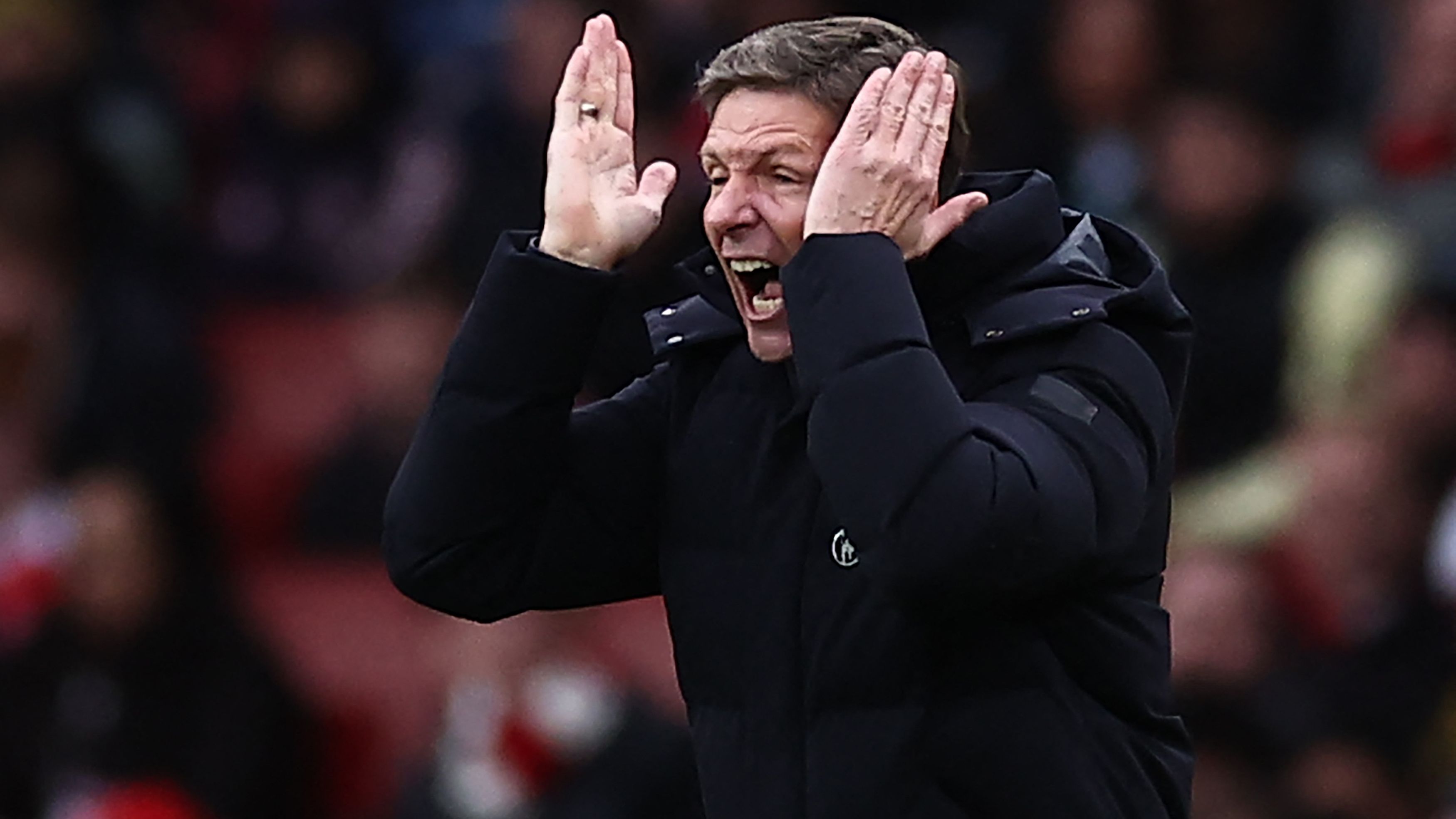


Why Crystal Palace’s Packed Schedule Sparks Urgent Calls for Player Protection
In the midst of advancing through tournament stages, Crystal Palace and their manager Oliver Glasner are now grappling with an overwhelming lineup of matches, raising serious concerns about athlete well-being as the holiday rush approaches. This scenario highlights the mounting pressures on teams like the Eagles, who must navigate a grueling calendar that threatens to compromise performance and health.
Challenges of a Crowded Fixture List for Crystal Palace
By making it to the quarter-finals, Crystal Palace is now confronted with a demanding slate that includes as many as five fixtures within a mere 10-day window, including back-to-back games over just five days leading into the festive period. The team is set to challenge powerhouses like Manchester City on December 14th, face Arsenal in the EFL Cup on December 16th, and take on KuPS in the UEFA Conference League on December 18th, turning what should be a celebratory time into a potential endurance test.
Conflicts with Unmovable European Commitments
The inflexibility of UEFA schedules has already compelled the EFL to spread out their third-round matches over two weeks to handle the surge in continental games. It appears inevitable that further adjustments will be necessary to allow Crystal Palace to complete their obligations during this already chaotic phase of the season, where every day feels packed with high-stakes encounters.
Recent Wins and the Intensifying Match Cycle
Their recent triumph at Liverpool has triggered a sequence of four matches squeezed into nine days, with upcoming clashes against Brentford, AZ Alkmaar, and Brighton lined up before the international pause. This rapid succession exemplifies how success in one competition can exacerbate scheduling woes across multiple fronts.
Glasner’s Push for Safer Scheduling Practices
Oliver Glasner has openly urged football’s key authorities to emphasize player safety by coordinating their timetables more effectively, aiming to shield athletes from unnecessary injury risks. In his remarks to the press on Friday, he expressed disbelief and frustration, stating, “Honestly, I can’t fathom that they’re handling this so carelessly. I believe this approach is utterly negligent towards the players.”
Emphasizing Collective Responsibility for Athlete Care
“It’s our duty to safeguard the players and prioritize their overall health- not just within our club, but across the board,” Glasner explained. He shared his initial shock upon hearing the plans, adding, “I was stunned when I first learned of it yesterday, and it’s left me deeply troubled. During the offseason in summer, those in charge of calendars should be collaborating to prevent such issues.”
Advocating for Inter-Organizational Dialogue
Glasner suggested that entities like UEFA, the Premier League, FA, and EFL should engage in joint discussions, as these overlaps aren’t unforeseen. “It’s disappointing and worrisome that this keeps occurring, which is why I’d insist on waiting for the draws to finalize before making adjustments that truly serve the players’ best interests-not for my sake or Crystal Palace’s, but for the athletes themselves. That’s their core role, and it’s what they’re compensated to handle,” he noted.
Disregarding Global Guidelines on Rest
Glasner highlighted how FIFA’s recommendations for enforced recovery time between matches have been overlooked by domestic governing bodies.
The Need for Practical Reforms
“If we played daily, my role would be straightforward-no need for detailed training plans, just briefings and straight into action. But what we’re missing is basic prudence,” he remarked. He referenced a July gathering in New York, where FIFA consulted various player groups and proposed a minimum 72-hour gap between official games as the top football authority.
Frustration with England’s Approach
“Yet, in England, it seems they’re ignoring those directives entirely. They’re simply advising to hold off until draws are set and then rearrange as needed. I find this baffling and am firmly advocating against cramming three games into four days, as it remains a reckless decision,” Glasner asserted.
The Demands of the Holiday Season and Beyond
The end-of-year period is notorious for its dense schedule in the football world, with the Premier League maintaining a non-stop run through Christmas and into January, unlike many European leagues that incorporate rest periods.
Impact of International Tournaments
Adding to the strain, the Africa Cup of Nations in Morocco from mid-December to mid-January will pull players from various teams. For Crystal Palace, this could mean losing just two squad members, such as Sarr, who recently netted two goals, and newcomer Christantus Uche, who might represent Senegal and Nigeria, respectively, towards year’s end.
Oliver Glasner’s Frustrations with Fixture Congestion
Understanding Fixture Congestion in the Premier League
Fixture congestion has become a hot topic in football, particularly in the Premier League, where teams like Crystal Palace face back-to-back matches that leave little room for recovery. Oliver Glasner, the current manager of Crystal Palace, has been vocal about how irresponsible scheduling by the FA (Football Association) puts undue strain on players and affects overall performance. This issue isn’t new, but Glasner’s criticisms highlight the real-world challenges of Premier League fixture congestion, emphasizing the need for better scheduling practices to prioritize player welfare.
In essence, fixture congestion refers to the clustering of matches in a short period, often due to overlapping competitions like the Premier League, FA Cup, and European tournaments. For Crystal Palace, this means navigating a demanding schedule that includes high-stakes games against top rivals, which can lead to fatigue and injuries. Keywords like “Premier League scheduling” and “FA fixture criticism” are frequently discussed in football circles, as they underscore the broader implications for team strategies and long-term success.
The Impact of Fixture Congestion on Crystal Palace
One of the key reasons Glasner has stepped forward is the direct effect on his squad. Crystal Palace’s demanding schedule often involves midweek fixtures sandwiched between weekend Premier League games, leaving players with minimal rest. This can manifest in various ways, such as:
- Increased Injury Risks: Players are more susceptible to muscle strains or overuse injuries when they don’t have adequate recovery time. For instance, a packed schedule might see Crystal Palace playing three games in a week, heightening the chances of key players like Eberechi Eze or Michael Olise missing important matches.
- Performance Decline: With less time for training and tactical preparation, teams may struggle to maintain their form. Glasner has pointed out that this irresponsible fixture congestion disrupts momentum, making it harder for mid-table teams like Crystal Palace to climb the standings.
- Mental Health Concerns: Beyond physical tolls, the constant pressure of a crammed calendar can affect players’ mental well-being, leading to burnout and reduced motivation.
Glasner’s critiques often focus on how the FA’s scheduling decisions fail to account for the human element in football. He argues that while the association aims to maximize revenue through more games, it overlooks the sustainability of the sport. This perspective resonates with many in the football community, as similar complaints have come from managers across the Premier League.
Glasner’s Specific Criticisms of the FA
Oliver Glasner has not held back in expressing his discontent, particularly after Crystal Palace endured a grueling run of fixtures. In recent comments, he described the FA’s approach as “short-sighted,” accusing them of prioritizing commercial interests over player safety. For example, during periods of international breaks or cup competitions, teams like Crystal Palace face an uneven distribution of games, which Glasner believes exacerbates fixture congestion.
To break this down further:
- Lack of Consultation: Glasner has called for greater input from managers and players in scheduling decisions. He suggests that the FA should collaborate more with clubs to avoid clashes, such as when Premier League matches overlap with continental commitments.
- Comparisons with Other Leagues: The manager often draws parallels with leagues like La Liga or Serie A, which have implemented better rest protocols. This highlights how Premier League fixture congestion could be mitigated through reforms, such as extending the winter break or reducing the number of midweek games.
- Real-Time Examples: In Crystal Palace’s case, a typical demanding schedule might include away games against powerhouses like Manchester United or Liverpool, followed by a domestic cup tie-all within a fortnight. Glasner has used these scenarios to illustrate the irresponsibility, urging the FA to reconsider their calendar planning.
Potential Solutions and Reforms in Football Scheduling
While fixture congestion poses challenges, there are practical steps the FA and other governing bodies could take. Crystal Palace’s situation under Glasner serves as a case study for wider reforms in Premier League scheduling. For starters:
- Reducing Match Density: Implementing mandatory rest periods between games, such as a minimum three-day gap for Premier League teams, could help alleviate the strain.
- Flexible Calendars: The FA might adopt a more adaptive approach, adjusting fixtures based on team workloads, especially for clubs involved in multiple competitions.
- Technology and Data Insights: Using player performance data and injury analytics, as Glasner has advocated, could inform smarter scheduling. This might involve AI-driven tools to predict and prevent overloads in demanding schedules.
These reforms could not only benefit Crystal Palace but also enhance the overall quality of the Premier League. By addressing Glasner’s concerns, the FA could foster a more balanced environment, reducing the risks associated with fixture congestion and promoting long-term player health.
Why This Matters for Fans and Teams
For fans of Crystal Palace and the broader football community, Glasner’s criticisms shed light on the human side of the sport. A demanding schedule doesn’t just affect results; it influences how teams like Crystal Palace build strategies and engage with supporters. Key phrases like “Oliver Glasner FA criticism” and “managing Premier League fixture congestion” are essential for understanding these dynamics, as they reflect ongoing debates about the future of football.
In practical terms, clubs could adopt internal measures, such as rotating squads more frequently or investing in advanced recovery techniques, to cope with these challenges. Glasner’s outspoken stance encourages dialogue, pushing for a Premier League where fixture congestion is managed responsibly, ensuring that the game remains exciting and sustainable for everyone involved.









